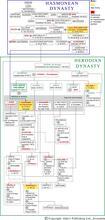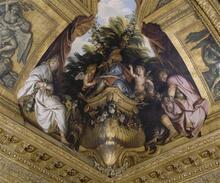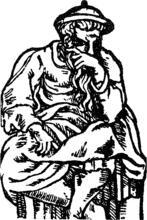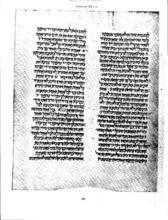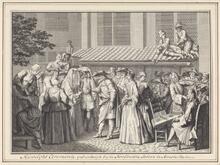Salome
Married thrice, Salome, King Herod’s sister, spent her life plotting against a myriad of people, including her sister-in-law Mariamme, her second husband Costaborus, and her nephews Alexander, Aristobulus, and Antipater. Her scheming is viewed negatively, but it is revealed later in her narrative that Herod’s court historian Nicolaus, who had a personal feud with her, was responsible for this portrayal. Nicolaus used Salome as a decoy to divert attention from the intrigue and violence of Herod’s personal life. He also held a grudge against Salome because of a disagreement about a question of inheritance, perhaps explaining why he depicted her as a monster.
Historical Record
Salome, King Herod’s sister, took an active role in many events associated with her brother’s reign. Almost all our information about her derives from the writings of Josephus. For this period Josephus relied heavily on the works of Herod’s court historian Nicolaus of Damascus, and our picture of Salome is marred by the latter’s personal feud with her. Herod’s personal life was full of intrigue and violence. Nicolaus used Salome as a decoy, to divert the reader’s wrath at these deeds away from her brother. Thus, she is described as the instigator of all the “tragedies” that befell Herod.
Marriages
Her date of birth is unknown. Her first mention, in 30 BCE, is already associated with her spying on Herod’s Hasmonean wife Mariamme and plotting to remove her (Josephus, Ant. 15:80–81). This event is also associated with Salome’s first marriage to her uncle, a certain Joseph (Ant. 15:65). While inciting Herod against his wife, she accused her husband of seducing Mariamme. Herod was persuaded and Joseph was executed. Following these events Salome is portrayed as relentlessly pursuing Mariamme, falsely accusing her of infidelity, treason, and even attempted murder. Finally in 27 BCE. she was successful, and Herod executed Mariamme (Ant. 15:213–231).
Her second marriage was to an Idumean aristocrat, Costaborus. This man, who had ambitions and took pride in his Idumean heritage, plotted against Herod. According to Nicolaus, Salome first aided him in his treasonous actions, but then changed her mind, divorced him, and accused him before Herod. Costobarus too was put to death (Ant. 15: 253–266). Salome had two children by Costobarus, a son, Antipater, and a daughter, Berenice.
After Costobarus’s death Salome became enamored of a sly Nabatean diplomat, Syllaeus, who was destined to play a vital role in Herod’s fall from favor with Rome. Salome’s affair with him is described in very unflattering terms, although it could be understood as an early attempt by the young diplomat to curry favor with Herod, before he became his enemy. He proposed properly and the match fell through only because he refused to convert to Judaism (Ant. 16:220–226).
Salome’s continuous activities, according to Nicolaus, included further plotting and intrigue. She became the worst enemy of Herod’s two sons by Mariamme—Alexander and Aristobulus—although her daughter Berenice was married to the latter. She even used her daughter to spy on Aristobulus (Ant. 16:201). Salome’s role in the long story of the two men’s downfall was decisive. Because Nicolaus acquitted Aristobulus and Alexander of the charge of treason for which they were executed, he made Salome the real guilty party. In 7 BCE, her efforts bore fruit and the boys were executed.
After the execution of Mariamme’s sons, Salome continued to pursue her deadly course and hunted down Herod’s eldest son, Antipater. Eventually her accusations against him succeeded and in 4 BCE, only a few weeks before Herod’s own death, he ordered the execution of Antipater. This too is described as Salome’s triumph. She served as both prosecutor and witness in his trial (Ant. 17:93).
Later Life and Interpretation
Only after Herod’s death do we learn why Nicolaus hated Salome. In the question of Herod’s will and Herod’s apparent heir, she supported the claim of Herod Antipas, while Nicolaus supported the pretensions of Archelaus. In a public hearing on the issue in Rome Nicolaus and Salome were found on two opposing sides of the question (Ant. 17.220). Nicolaus partially carried the day. Yet when he eventually wrote Herodian history, he did not forgive Salome for this affront and made her into a monster.
His grim picture of Salome may not be true to life, as is implied not only from the circumstantial evidence amassed against her but also from the fact that Herod himself made her a major beneficiary of his will (Ant. 17:147, 189, 321). He at least did not consider her an enemy. But further, a bizarre story associated with Herod’s death, which certainly did not come from Nicolaus, and which is also recorded in Jewish sources (Scholion to Lit. "scroll." Designation of the five scrolls of the Bible (Ruth, Song of Songs, Lamentations, Ecclesiastes, Esther). The Scroll of Esther is read on Purim from a parchment scroll.Megillot Ta’anit Shevat 2), relates that Herod, on his deathbed, ordered the execution of many Jewish nobles. Thus, the Jews, while mourning them, would appear to mourn him. Salome, when left in charge of the execution of this order, freed the men and was hailed a hero (Ant. 17: 173–9; 193). Clearly not everyone considered Salome wicked.
At the end of her life Salome was married a third time to a certain Alexas, friend of Herod (Ant. 17:10). After her failure to nominate Herod Antipas heir to her brother, she remained in Rome with her daughter and grandchildren, where she died in 12 CE, bequeathing her patrimony to her friend Livia, the emperor’s wife.
Brooten, Benadette J., “Könnten Frauen im alten Judentum die Scheidung betreiben?
Überlegung
zu Mk 10, 11–12 und 1Kor 7, 10–11,” Evangelische
Theologie 42 (1982): 65–80.
Very little has been written about Salome in the literature. One of the few
issues in her life which aroused interest was the divorce document she sent
her husband. Brooten discusses this document within the evidence for Jewish
women’s divorce rights in antiquity.
Ilan, Tal. Integrating
Jewish Women into Second Temple History, 115–125. Tübingen: 1999.
This discussion is the most complete study of Salome in her own right. It
espouses the thesis suggested here, that Salome’s evil character derives from
Nicolaus of Damascus’ enmity to her.
Kokkinos, Nikos. The
Herodian Dynasty, Origins, Role in Society and Eclipse, 177–192. Sheffield:
1998.
The merit of this discussion of Salome’s exploits is the novel introduction
of diverse sources, which do not refer to her directly, but which Kokkinos
finds useful for a discussion of the woman. He also mentions Galan, Strabo
and papyri as other sources in which she is mentioned.
Macurdy, Grace. Vassal-Queens
and Other Contemporary Women in the Roman Empire, 69–77. Baltimore:
1937.
The most thorough, though rather simplistic biography of Salome found in the
literature.
Rabello, Mordechai A. “Divorce of Jews in the Roman Empire,” The
Jewish Law Annual 4 (1981): 92–93.
This is another discussion of the divorce bill sent by Salome to her husband,
this time within the context of the Roman world.
Schalit, Abraham König
Herodes: Der Mann und sein Werk, 563–644. Berlin: 1969.
In this chapter, Schalit discusses Herod’s court and family affairs. He devotes
a fair proportion of it to Salome’s machinations, but accepts Nicolaus’s rhetoric
and judgment of her at face value.

